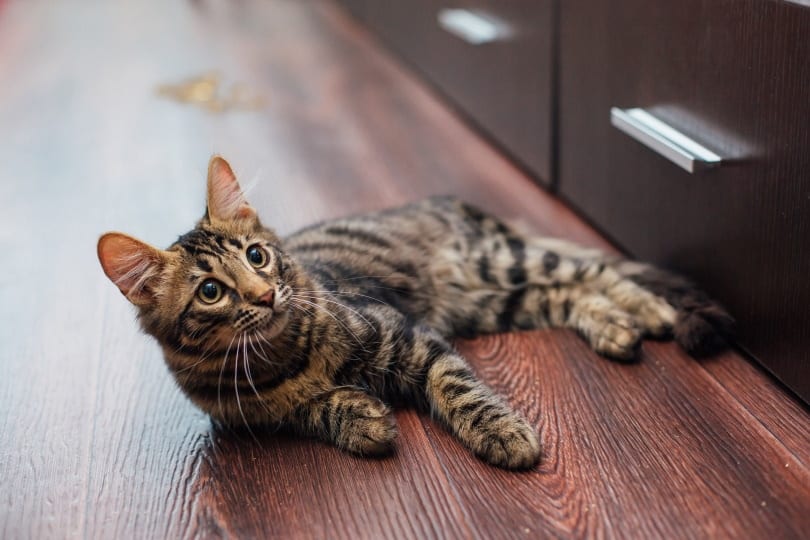
The information is current and up-to-date in accordance with the latest veterinarian research.
Learn more »
Anytime your cat bleeds, it is concerning. Often, bleeding that continues for more than a few minutes is a sign that your cat needs veterinary attention. Before we jump into why your cat may be leaving drops of blood everywhere, it’s important to realize that vet care may be necessary. You should call your vet immediately if your cat is lethargic or bleeding profusely.
There are many reasons why your cat may be leaving blood spots everywhere. Some reasons are pretty benign and can be treated at home. For instance, tiny blood spots in wet places often indicate a flea infestation. Female cats may also leave tiny blood spots when in heat. Of course, that doesn’t require any veterinary treatment.
However, drops of blood can also be a sign of crystals or a bladder infection. Any injury can cause bleeding but some injuries may easily stay hidden from view (such as those in the mouth). Therefore, visiting a vet is necessary unless the blood is obviously from something benign.
Let’s look at why your cat may leave drops of blood everywhere.
The 6 Likely Reasons Your Cat Is Leaving Blood Drops
1. An Injury
Any cut or scrap can cause bleeding. Sometimes, the injuries are on sensitive parts of the cat’s body, which can lead to the wound regularly breaking open. Therefore, your cat may bleed for a bit, stop, and then bleed again. Often, vet attention isn’t required for these injuries, but you should keep an eye out for infections.
However, your cat may have a cut somewhere that’s harder to see. For instance, your cat may have a cut inside their ear, between their paw pads, or in their mouth. You can check the areas thoroughly to see if you can identify the source of bleeding.
Again, small cuts and scrapes don’t always require vet attention. However, if anything seems off about the injury, give your vet a call.
Image Credit: Kittima05, Shutterstock
2. Nose Bleeds
Cats can get nosebleeds like people, but it is rare. Usually, nosebleeds are the result of an injury to the nose. The inside of the nose is very sensitive, and any injury can bleed more than it would if it occurred elsewhere. All nosebleeds should stop within 10 minutes, however.
If your cat gets multiple nosebleeds or doesn’t stop bleeding, it could indicate an underlying condition. Tumors, dental issues, and bleeding disorders can also cause bleeding from the nose.
Therefore, this is usually a “wait and see” situation. If your cat stops bleeding, it’s probably just due to irritation or injury. However, if the bleeding continues or occurs regularly, you should visit the vet.
3. Urinary Tract Problems
Sadly, UTIs and similar problems are common in cats. Felines were designed to consume much of their water from their prey. However, many cats are fed kibble with little water, which can lead to urinary issues.
Minor urinary tract issues usually don’t cause bleeding. However, more serious ones do, so if your cat has blood in their urine, it is time to see a vet. More serious infections can cause bleeding, but they can also be a sign of kidney and liver damage.
Image Credit: one photo, Shutterstock
4. Estrus
Some cats bleed whenever they are in heat, while others never do. Usually, this doesn’t require vet attention but you’ll want to contact your vet if the bleeding continues. Cats can get sick in heat, so the bleeding could be linked to UTI problems. Therefore, figuring out what the bleeding is caused by can be complicated in these situations.
If you aren’t a breeder, we recommend getting your cat spayed. This removes the complexities associated with a cat in heat.
5. Fleas
If your cat is very infested with fleas, they can leave bloody smears in wet places. However, that isn’t because they are bleeding. Fleas drink your cat’s blood and then defecate dried blood. When the dried blood is met with water, it can rehydrate and look like fresh blood.
The dried blood will build up on your cat’s skin. For this to happen, your feline must be heavily infected by fleas. Usually, fleas can be treated at home, but a severe infestation requires veterinary attention. We recommend checking your cat carefully for fleas and making a judgment call.
Image Credit: Nikolay Bassov, Shutterstock
6. Other Serious Conditions
Several other serious conditions can cause bleeding. However, they are rarer, and all of them require veterinary attention. If you still haven’t identified the source of your cat’s bleeding, it’s time to call the vet—even if they aren’t bleeding much.
Cancers, coagulopathies, and toxicities can all lead to unexpected bleeding and require veterinary treatments.
When Should You Visit the Vet?
Bleeding can be troublesome and scary, especially if no obvious cause exists. Luckily, most instances of your cat’s bleeding are likely benign. We recommend checking your cat carefully for injuries. Figuring out where your cat is bleeding from can be extremely helpful in determining why they are bleeding.
If you don’t notice any injuries, check for other signs. Cats are good at hiding their illnesses. Therefore, you may only notice slight changes in temperament and behavior. However, even slight changes should be taken seriously and noted.
After checking your cat for injuries and reading through our list of reasons, you may be able to figure out why your cat is bleeding. However, if you still have no idea, we recommend visiting your vet. Most benign causes are pretty easy to figure out, while more serious causes are usually more mysterious.
Image Credit: Juice Flair, Shutterstock
Conclusion
If your cat is bleeding for no apparent reason, it can signify that something more serious is happening. However, it can also signify a minor injury or other benign cause. Seeing tiny drops of blood doesn’t always mean that there is something wrong with your cat.
However, we recommend checking your cat over to determine the potential cause of bleeding. Most benign causes can be determined pretty easily, but the more serious causes are harder to identify. When in doubt, it’s always best to check with your vet.
See also:
Featured Image Credit: Smile19, Shutterstock






